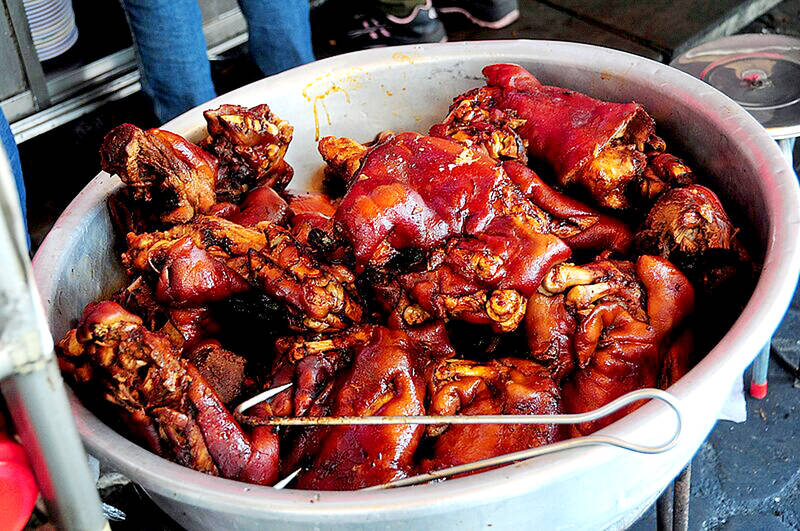Roasted German trotter is a popular dish known for its crispy outer layer. In contrast, Taiwanese prefer to braise trotters, especially front trotters, as they are used more by a pig to walk and thus are leaner and have more tendons. This results in a gelatinous texture with a less greasy taste. After removing hair, quick-boiling, and cooling, they are marinated in a mixture of soy sauce, crystal sugar, and a spice pouch of Chinese herbs for a long period to achieve a bright amber appearance. The dish can be enjoyed hot or cold, and it is usually served with a dipping sauce that varies from restaurant to restaurant.
德國豬腳外皮酥脆聞名,然而台灣人更偏好用滷的,特別選用豬前蹄來滷,豬平時走路多用前腳,肉瘦多筋,富有膠質,吃起來不油膩。將豬腳去毛、汆燙、冷卻後,再以醬油、冰糖和中藥滷包長時間燉滷,滷好的豬腳呈琥珀色,既可以熱食也可以冷食,沾著各家獨門調製的沾醬享用。
lean (adj.)(肉)脂肪少的,精瘦的

Photo: Flickr l 圖片:Flickr
tendon (n.) 肌腱,筋
remove (v.) 去除
marinate (v.) 醃
Chinese herb (n. phr.) 中藥
amber (n.) 琥珀; (adj.) 琥珀色的
dipping sauce (n.) 沾醬
Braised trotter is a popular dish in Taiwanese cuisine, and Wanluan’s version is particularly well-known. Originally an agricultural community, Wanluan was home to many Hakka villagers. The farms there mainly produce betel nuts. In 1981, then president Chiang Ching-kuo visited Wanluan Township and tasted braised trotters at the Haihong Restaurant, helping to spread the dish’s reputation throughout the island. The popularity inspired other villagers to start their businesses selling braised trotters, leading to the establishment of Wanluan Pig Trotter Street in 2004 by the Pingtung County Government. The street has attracted many visitors to enjoy this local signature dish.
台灣以萬巒豬腳最為有名,萬巒鄉民早年務農,大多為客家人,主要種植檳榔。1981年,先總統蔣經國先生下鄉視察,途經萬巒的海鴻飯店品嘗豬腳,讓萬巒豬腳的名聲大燥。屏東縣政府於2004年順勢推出萬巒豬腳街,吸引許多遊客前來大啖豬腳。
betel nut (n.) 檳榔
signature dish (n phr.) 招牌菜
Taiwanese people eat trotters not only because they are delicious, but because they are customarily eaten to get rid of back luck. Braised trotters misua are consumed after overcoming a challenging time, such as recovering from illness or being released from jail. This is reflected in the Taiwanese Hokkien proverb: “It’s the most unfortunate who step in pig manure.” Pigs living in a pigsty always step in their manure, so they are considered the most unfortunate creatures. Eating the trotters symbolizes that people have already overcome difficult times in life, hoping that only good luck will continue to come their way.
吃豬腳可不僅是為了享口福,也有吃豬腳去霉運的習俗。台灣人在經歷過康復和出獄等重大關卡後,會吃豬腳麵線。有句台語諺語這麼說:「衰到踏到豬屎。」豬養在豬圈中,每天都在踩豬屎,十分倒楣。吃豬腳象徵著已經跨過了人生最壞的境地,之後將否極泰來,好運連連。
manure (n.) 糞便,糞肥
pigsty (n.) 豬舍
Taiwanese people, besides having a birthday cake, will also serve braised trotters misua to celebrate at an elder’s birthday banquet. People in ancient times believed that the longer one’s face is, the longer one can live. “Face” sounds like the word for “noodles” in Chinese, so long thin noodles are also called “longevity noodles.” Therefore, braised trotters misua can also be enjoyed as wishes for good luck and longevity.
除此之外,台灣人會在長輩生日時,除了吃蛋糕、吹蠟燭,也會吃豬腳麵線,祝福長輩事事順心、長命百歲。因為古人認為臉越長,壽命就越長,而「面」與「麵」同音,所以又細又長的麵線又稱為「長壽麵」,自古以來視為長壽的象徵。因此,吃豬腳麵線也祝福長輩事事順心、長命百歲的含意。
banquet (n.) 宴會
longevity (n.) 長壽
文章由書林出版公司提供:
www.bookman.com.tw

A: When is the Lantern Festival? B: The festival is celebrated on the 15th day of the first month of the lunar calendar, which fell on Feb. 12 this year. A: Oh no! Did I miss the 2025 Taipei Lantern Festival? B: Yes, you did. But you can still go to the 2025 Taiwan Lantern Festival in Taoyuan, which will run until this Sunday. A: Let’s go admire the exuberant lanterns. A: 元宵節到底是哪一天? B: 就是農曆1月15日啊,今年則落在國曆2月12日。 A: 喔不,我是不是錯過了2025台北燈節? B: 是的,但你還可以去桃園的2025台灣燈會,活動將持續至週日。 A: 那我們去欣賞豐富的花燈秀吧! (By Eddy Chang, Taipei Times/台北時報張聖恩)

A: What’s the theme of the 2025 Taiwan Lantern Festival’s main lantern? B: The theme is “Paradise,” and the main lantern is a snake-shaped “infinity” symbol that features a lighting show every half an hour. A: Cool, I heard that there are over 300 lanterns. B: There are even giant lanterns in the shape of Pikachu and some other popular Pokemon characters. A: Let’s go now. A: 2025台灣燈會主燈的主題是什麼? B: 主題是「無限樂園」!主燈的造型則是蛇形的數學「無限號」,主燈每半小時還有一次燈光秀。 A: 酷喔,聽說總共有300多件花燈作品。 B: 甚至還有皮卡丘和其他熱門寶可夢角色的巨型花燈呢。 A: 哇我們現在就出發吧! (By Eddy Chang, Taipei Times/台北時報張聖恩)

本文由生成式AI協作,本刊編輯編修。 Tucked away in southwestern Taiwan, Yunlin County is a treasure trove of cultural heritage, rich history, and natural beauty. From its stunning temples and glove puppetry to historical architecture and picturesque landscapes, Yunlin rewards those who venture off the beaten path. Yunlin is renowned for its flourishing temple culture. Temples in this region are not merely places of worship but also communal centers where people gather for festivals, rituals, and social functions. One of the most notable temples here is the Beigang Chaotian Temple, which was built more than 300 years ago and is dedicated to Matsu, the sea

Nestled within the heart of Taipei, National Taiwan University (NTU) contains a grand and spacious sanctuary where nature and academia come together in perfect accord. Across its expansive 111-hectare campus, NTU reveals a landscape rich with history, lush greenery, and a thoughtfully preserved ecosystem. This tranquil haven invites visitors to take their time wandering among the elegant buildings, to admire the rare plants, and to experience a space that exudes quiet inspiration. Zhoushan Road: A Gentle Prelude to NTU’s Tranquility Beginning at Gongguan MRT Station, the enchanting avenue Zhoushan Road leads visitors into NTU shaded by golden rain trees, cottonwoods, and Javanese